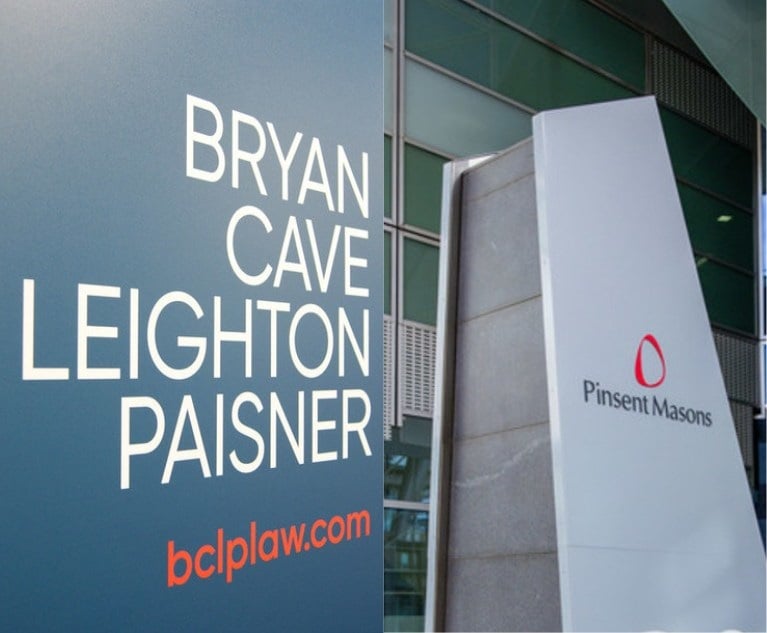Linklaters accounts show double-digit growth in US and Asia
Linklaters' operations in Asia and America both saw double-digit increases in revenue during the 2010-11 financial year, according to the City law firm's latest public accounts. The accounts, which cover the period from 1 May 2010 to 30 April 2011, show revenues for the regions respectively stood at £135.2m and £88.4m, representing increases of 10% and 12%.
November 30, 2011 at 09:52 AM
2 minute read
Linklaters' operations in Asia and America both saw double-digit increases in revenue during the 2010-11 financial year, according to the City law firm's latest public accounts.
The accounts, which cover the period from 1 May 2010 to 30 April 2011, show revenues for the regions respectively stood at £135.2m and £88.4m, representing increases of 10% and 12%.
Continental Europe made up £451.1m of Linklaters' £1.2bn turnover – up 3% on the previous year, while UK and Middle East revenues dropped 4% from £542.1m to £522.6m during the period.
Profit for the limited liability partnership (LLP) for the year stood at £372.4m, down slightly from £374.1m in 2009-10.
The accounts also reveal that the highest-paid lawyer at the firm took home £2.2m during the last financial year, compared with the same amount the previous year and £2.5m in 2008-09. Such earnings, which are well above the top of the firm's lockstep, are usually due to one-off payments such as retirement contributions.
This figure comes against the backdrop of a 0.9% increase in average profits per equity partner (PEP) to £1.225m in 2010-11. The firm had 315 members in the LLP at the end of April 2011, up marginally from 312 the previous year.
Meanwhile, staff costs increased by 3% between 2009-10 and 2010-11, standing at £556.8m up.
The accounts also reveal that firm's pension scheme deficit stood at £1.5m compared with £1.9m in 2009-10. The deficit in the firm's other post-retirement benefit scheme increased to £2.2m from £1.9m.
The news comes two years after Linklaters announced the closure of its final salary pension scheme, which saw it transfer 50 members of staff to a contribution-based pension scheme on 1 December 2009.
The accounts also include details about the nature of Linklaters' partnership, which has been moving towards an all-equity model in recent years. It states that most partners receive 10 profit-sharing units when they join the equity, increasing by 1.5 units a year for 10 years.
The firm aims to ensure that capital levels do not drop below £40m and is required to secure a majority vote from members if they are called on to contribute more than £20,000 per profit share.
This content has been archived. It is available through our partners, LexisNexis® and Bloomberg Law.
To view this content, please continue to their sites.
Not a Lexis Subscriber?
Subscribe Now
Not a Bloomberg Law Subscriber?
Subscribe Now
NOT FOR REPRINT
© 2025 ALM Global, LLC, All Rights Reserved. Request academic re-use from www.copyright.com. All other uses, submit a request to [email protected]. For more information visit Asset & Logo Licensing.
You Might Like
View All
A&O Shearman, Cleary Gottlieb Act on $700M Dunlop Tire Brand Sale to Japan's Sumitomo


Stewarts and DAC Beachcroft Lead on £2B Leicester City Helicopter Crash Litigation

Israel's Rushed Corporate Tax May Spark Law Firm Mergers, Boost Large Firms Including Gornitzky
4 minute readTrending Stories
- 1The 'Motherhood Advantage' in Law: Time to Flip the Script
- 2Fenwick & West Shutters Decade-Old Shanghai Office
- 3Thompson Coe, 2 Lawyers, Hit by $1M+ Legal Mal Suit
- 4Regulatory Intelligence Platform Abstract Announces $4.8 Million in Seed Funding
- 5Former Sacks Weston Partner Faces 5-Year Suspension Over Mail, Wire Fraud Conviction
Who Got The Work
Michael G. Bongiorno, Andrew Scott Dulberg and Elizabeth E. Driscoll from Wilmer Cutler Pickering Hale and Dorr have stepped in to represent Symbotic Inc., an A.I.-enabled technology platform that focuses on increasing supply chain efficiency, and other defendants in a pending shareholder derivative lawsuit. The case, filed Oct. 2 in Massachusetts District Court by the Brown Law Firm on behalf of Stephen Austen, accuses certain officers and directors of misleading investors in regard to Symbotic's potential for margin growth by failing to disclose that the company was not equipped to timely deploy its systems or manage expenses through project delays. The case, assigned to U.S. District Judge Nathaniel M. Gorton, is 1:24-cv-12522, Austen v. Cohen et al.
Who Got The Work
Edmund Polubinski and Marie Killmond of Davis Polk & Wardwell have entered appearances for data platform software development company MongoDB and other defendants in a pending shareholder derivative lawsuit. The action, filed Oct. 7 in New York Southern District Court by the Brown Law Firm, accuses the company's directors and/or officers of falsely expressing confidence in the company’s restructuring of its sales incentive plan and downplaying the severity of decreases in its upfront commitments. The case is 1:24-cv-07594, Roy v. Ittycheria et al.
Who Got The Work
Amy O. Bruchs and Kurt F. Ellison of Michael Best & Friedrich have entered appearances for Epic Systems Corp. in a pending employment discrimination lawsuit. The suit was filed Sept. 7 in Wisconsin Western District Court by Levine Eisberner LLC and Siri & Glimstad on behalf of a project manager who claims that he was wrongfully terminated after applying for a religious exemption to the defendant's COVID-19 vaccine mandate. The case, assigned to U.S. Magistrate Judge Anita Marie Boor, is 3:24-cv-00630, Secker, Nathan v. Epic Systems Corporation.
Who Got The Work
David X. Sullivan, Thomas J. Finn and Gregory A. Hall from McCarter & English have entered appearances for Sunrun Installation Services in a pending civil rights lawsuit. The complaint was filed Sept. 4 in Connecticut District Court by attorney Robert M. Berke on behalf of former employee George Edward Steins, who was arrested and charged with employing an unregistered home improvement salesperson. The complaint alleges that had Sunrun informed the Connecticut Department of Consumer Protection that the plaintiff's employment had ended in 2017 and that he no longer held Sunrun's home improvement contractor license, he would not have been hit with charges, which were dismissed in May 2024. The case, assigned to U.S. District Judge Jeffrey A. Meyer, is 3:24-cv-01423, Steins v. Sunrun, Inc. et al.
Who Got The Work
Greenberg Traurig shareholder Joshua L. Raskin has entered an appearance for boohoo.com UK Ltd. in a pending patent infringement lawsuit. The suit, filed Sept. 3 in Texas Eastern District Court by Rozier Hardt McDonough on behalf of Alto Dynamics, asserts five patents related to an online shopping platform. The case, assigned to U.S. District Judge Rodney Gilstrap, is 2:24-cv-00719, Alto Dynamics, LLC v. boohoo.com UK Limited.
Featured Firms
Law Offices of Gary Martin Hays & Associates, P.C.
(470) 294-1674
Law Offices of Mark E. Salomone
(857) 444-6468
Smith & Hassler
(713) 739-1250








